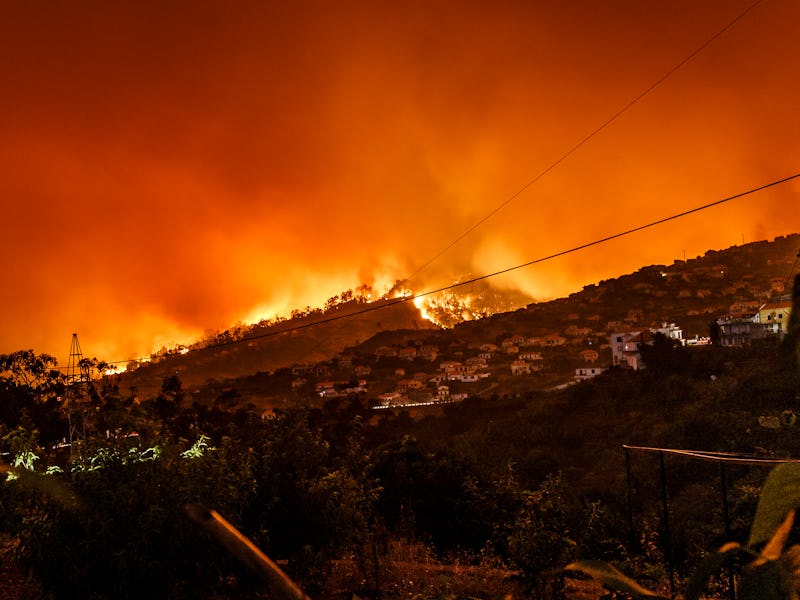The White House Rebranding of Climate Change Could Be Frighteningly Effective
1984 much?

Would you take “weather extremes” just as seriously as the phrase “climate change”? The government believes that Americans will buy the euphemism — and it’s worrying many environmentalists that the Orwellian “Newspeak” might be grounds for subtle psychological manipulation in tamping down the urgency of climate change.
A series of emails leaked to the Guardian over the weekend from the Natural Resources Conservation Service, a division of the USDA that handles land conservation for farmers, show the agency’s director of soil health, Bianca Moebius-Clune, listing phrases staff should “avoid,” offering a list of alternatives.
“We won’t change the modeling, just how we talk about it,” Moebius-Clune says in the memo from February. “There are a lot of benefits to putting carbon back in the sail [sic], climate mitigation is just one of them.”
Among them:
“Weather extremes” instead of “climate change”
“Resilience to weather extremes” instead of “climate change adaptation”
“Build soil organic matter” or “increase nutrient use efficiency” instead of “reduce greenhouse gases”
Euphemism much?
Critics have been quick to lash out at President Donald Trump’s administration for quietly erasing climate change data along with offering a list of euphemisms in place of scientific terms, noting the disturbing links between the softening of language in real life and George Orwell’s dystopian novel 1984. Society uses “Newspeak” in 1984, language that softens straightforward, accepted terms into ones that “make all other modes of thought impossible.”
The scary part is just how effective euphemisms appear to be, according to recent studies.
In 2007, a team of researchers led by psychologist Steven Pinker wrote a paper titled “The Logic of Indirect Speech,” where they mapped out why “Newspeak” makes us think “weather extremes,” for example, is less dangerous than “climate change.” Doing so means leaders have leeway later on to deny knowing what was really going on, or to change their position to fit public opinion. But dressing phrases up with fancy linguistic wordplay has the disturbing ability to make a person using it for wrongdoing think they’re in the right and good — and therefore have no concept of the morally suspect nature of their actions.
In a 2015 study in the journal Cognitive Science, researchers presented participants with four hypothetical, “small-scale” unethical quandaries, like slipping a cop a couple bills to let an offense go with a nudge and a wink. The researchers found that it was all in the phrasing: Regardless of whether participants were put in the role or asked to judge someone hypothetically doing the wrong, indirect speech — euphemisms, newspeak, etc. — made the person feel like their actions were morally a-okay, even though they knew very well they were not.
It comes down to basic neuroscience. Your brain processes sound and directly translates the sound of a word into its meaning. The meaning of “climate change” is very different from “extreme weather,” which means your brain is assigning the former phrase one that might be more charged with emotion and politics than the latter, which may seem more natural with no human fault at hand.
The authors of the 2015 study point out that our brains aren’t built to deal with guilt and angst straight-on: If we can avoid thinking about what our actions mean for the world, it’s easier and more straightforward and frankly, more efficient. Having a moral compass isn’t necessarily efficient, and cloaking phrases like “climate change” in other phrasing makes them seem a lot less dangerous. It doesn’t help that Trump’s nominee for leading the USDA, Sam Clovis, is an expert euphemism wielder, turning “progressives” to “race traitors” and belittling climate change as “junk science,” telling Iowa Public Radio in 2014 that he knows he’s being “boofed.”
The disturbing consequence of assigning alternative phrasing to scientific terminology is that we become increasingly comfortable with being morally ambiguous and look away when something amoral happens. In 1984, that means that “a heretical thought … should be literally unthinkable.” In 2017 America, it means that climate change is just extreme weather — even though it’s not.